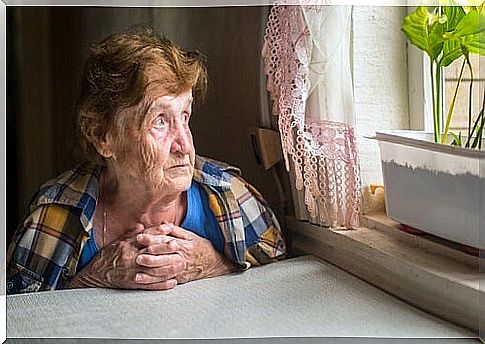How Does Loneliness Affect The Health Of The Elderly?

In times of sadness, anger or disappointment, no doubt, many people prefer to isolate themselves and seek their tranquility in solitude.
However, there comes a time when we calm down and with that we feel the need to feel the company and support of all those who, in one way or another, motivate us to live again.
Almost no one, by their own decision, decides to be alone. That’s because being surrounded by more people and feeling important to someone is a need for everyone.
The sad thing is that some people, especially when they reach old age, suffer isolation from their family and loved ones; being, many times, completely abandoned until the day of his death.
Research on this subject has found loneliness to be a serious problem of unhappiness that focuses on premature death.
It has also been shown to be associated with deteriorating mental health as well as cardiovascular disease , hypertension and dementia.
How does loneliness affect the elderly?
It is estimated that 10% of the elderly suffer from malignant loneliness, that is, one that compromises physical and emotional health.
Among all of them, 70% have a serious health problem associated with loneliness; problems in both the psychological and physical fields.
In general, loneliness influences brain health in a very similar way to chronic stress. Both provoke a negative response in the endocrine and immune systems which, in turn, makes the body more prone to develop different pathologies.

According to the director of the Instituto de Investigaciones Psiquiátricas (Institute of Psychological Investigations – IIP), Dr. Manuel Martín Carrasco, “ the common diseases in a state of loneliness are high blood pressure, diabetes, repeated infections, anxiety and depression ”.
In the case of elderly people, the effects are more direct and negative due to the decrease in physiological resistance capacity. That is, the body’s ability to withstand and adapt to adverse conditions; in addition to the reduction of repair mechanisms, as a consequence of aging itself.
the problem of loneliness
It is estimated that this problem is increasing and that in a few years it could become a global public health problem.
For specialists on the subject, any reduction in loneliness can benefit the health of the elderly, as it is considered that “the first factor that ensures a good quality of life is having social relationships”.

The president of the Organización Women’s Royal Voluntary Service, David McCullough, who has the support of more than 40,000 volunteers supporting older people in the UK, says that the problem of loneliness and its health consequences is disappearing. extending.
He and his group of volunteers are trying to help people in need. Mainly the elderly who, in conditions of loneliness, already suffer from illness, loss of mobility and mental problems.
Data from the United Kingdom show that most elderly people feel alone or abandoned, especially from 65 onwards.
Therefore, considering that any daily social contact can reduce the effects of loneliness, this organization works to feed, shelter and accompany people who, for one reason or another, were left alone in this world.
Is there a solution?

When in a condition of solitude, one of the determining factors is the type of social activity carried out throughout life.
In this sense, it is difficult to provide treatment and support to an elderly person who has had difficulties to socialize his whole life and who was marked by rejection, disorganization or fear.
However, with personalized treatment and psychological and even psychiatric intervention, it is possible to provide a solution for these situations.
In addition, support groups, services that offer companionship, seniors groups, and simply having a person during the day to talk to can contribute to overcoming loneliness and improving health in many respects.









